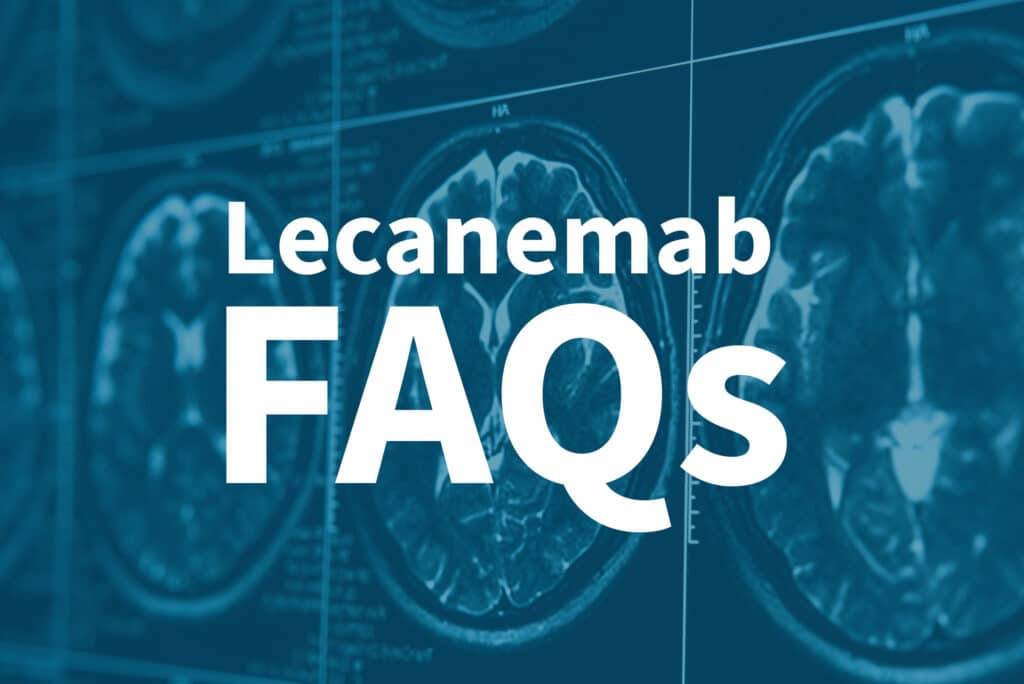Lecanemab FAQs

Monoclonal amyloid antibody infusions for Alzheimer’s Disease (aducanumab, and lecanemab):
Frequently Asked Questions (last updated 07JULY2023)
We understand that many of our patients and families have questions regarding new medicines for Alzheimer’s disease (aducanumab, donanemab, and lecanemab). Please see below FAQ’s for better understanding of the medications, FDA approval, Medicare coverage and availability at Emory Healthcare.
What are aducanumab, donanemab, and lecanemab?
• The medicines are monoclonal antibodies that target and remove amyloid plaques from
the brain. Amyloid plaques are increased in the brains of those with Alzheimer’s disease.
• The medicines were tested in patients diagnosed with mild cognitive impairment (MCI) or early-stage dementia who have evidence of amyloid plaques in their brains. Patients with moderate to severe stages of Alzheimer’s disease were not included in the clinical trials and will not be eligible.
• Clinical studies were mixed on whether aducanumab could slow the cognitive decline
associated with Alzheimer’s disease.
• A news release May 3, 2023, on the phase 3 donanemab clinical trial, reported less cognitive decline in subjects on donanemab compared to those on placebo. We are awaiting additional publication of data from the donanemab phase 3 clinical trial.
• An article published January 5, 2023, in the New England Journal of Medicine
(‘Lecanemab in Early Alzheimer’s Disease’) demonstrated less cognitive decline in subjects on lecanemab as compared to those on placebo.
How are aducanumab, donanemab, and lecanemab administered?
• Medications are given by intravenous infusion at a specialized infusion center using a small temporary IV catheter in the arm (aducanumab: monthly; donanemab: monthly; lecanamab: every two weeks.)
• The infusion is administered over 1-2 hours.
• People receiving these medications may develop minor or severe allergic reactions and need to be monitored closely during the first few infusions.
• The clinical trials showed that subjects developed small bleeds or swelling in the brain (~2 in 10 for lecanemab; ~3 in 10 for donanemab; ~4 in 10 for aducanumab). For most subjects, these side effects did not cause significant symptoms and required subjects to briefly stop the medication to allow the brain changes to go away. Some subjects had headaches, confusion, dizziness, and nausea.
• More serious symptoms were noted in a small number of patients, including death.
• Brain scans (MRIs) are needed every few months to monitor for bleeding and swelling in the brain. Patients not able to have MRIs will not be eligible for treatment.
Are aducanumab, donenamab and lecanemab approved by the U.S. Food and Drug
Administration (FDA)?
• Aducanumab (Aduhelm) received accelerated approval from the FDA on June 7, 2021. Accelerated approval means that aducanumab affects the underlying disease process that may predict a clinical benefit to patients. Two large randomized controlled trials were mixed in whether aducanumab had clinical benefit.
• Donanemab phase 3 clinical trial top line results were released (May 3, 2023) by the company that makes the medication. They expect to submit for FDA review in quarter 2 of 2023. Donanemab is not yet FDA approved.
• Lecanemab (Leqembi) received full FDA approval July 6, 2023. One randomized controlled demonstrated that subjects on lecanemab had less cognitive decline.
What is the cost of these medications and are they covered by Medicare or other
insurance companies?
• The last reported cost of aducanumab was ~$28,200 per year without insurance. As of January 6, 2023, the reported cost per year for lecanemab is $26,500. No cost estimates have been provided for donanemab yet.
• Additional costs include the infusion center time and supplies, multiple brain scans, clinical evaluations, and laboratory evaluations. These costs may not be covered or may only partially be covered by insurance.
• Medicare announced that aducanumab will only be covered by Medicare through Medicare-approved randomized clinical trials that are aimed at understanding how helpful aducanumab is for patients. Medicare will not cover the cost of aducanumab if prescribed in a clinical setting by a provider. Patients with insurance coverage other than Medicare should check with their insurance provider to see if similar restrictions apply.
• Medicare released a statement July 6, 2023, with details on how Medicare will cover lecanemab. This coverage is dependent on the patient meeting all FDA label requirements, has a diagnosis of mild cognitive impairment or mild dementia due to Alzheimer’s disease with documented evidence of amyloid plaques in the brain, is enrolled in Medicare Part B, and has a physician (and appropriate clinical team and follow-up care) participating in a qualifying patient registry to collect evidence about how these new medications work in the real world. People with Original Medicare will pay the standard 20% coinsurance of the Medicare-approved amount for the medications after they meet the Part B deductible. Patients with supplemental coverage, other secondary (or primary) insurance or Medicare Advantage should contact their plan about coverage is costs may be different.
• No information is available yet on donanemab concerning insurance coverage, however, if it receives traditional FDA approval, donanemab would be covered in the context of a clinical registry (as noted above).
Are aducanumab, donanemab, and lecanemab available at Emory Healthcare?
• Aducanumab: Emory Healthcare, along with other institutions like Cleveland Clinic, Mount Sinai, Mass General Brigham, and the Veterans Affairs Hospital System, decided not to add aducanumab to its pharmacy formulary. The decision was based on review of all available data on aducanumab including the amount of benefit to patients, safety and risk of side effects, and value/cost to patients. This decision may be revisited in the future if additional data becomes available. In summary, aducanumab is not available for infusion within the Emory Healthcare system.
• Donanemab: This medication has not yet received FDA approval and is not yet available
at Emory Healthcare.
• Lecanemab has been placed on the formulary at Emory Healthcare and will be available
mid-late July 2023.
How do I know if I am eligible for lecanemab (or other monoclonal amyloid antibodies)?
• The Emory Cognitive Clinic team has started reaching out to individuals who may be eligible. These are patients with a diagnosis of mild cognitive impairment or very mild dementia who have positive biomarkers for Alzheimer’s disease (spinal fluid or amyloid brain PET scan). Patients cannot have other causes of dementia (Lewy body, vascular, frontotemporal, etc) and must not have other medical conditions that are poorly controlled (like high blood pressure, diabetes, elevated cholesterol, renal failure). Please see detailed inclusion/exclusion criteria on the next 2 pages.
• If you have questions about your eligibility or think you may be eligible but have not yet been contacted, please reach out to your provider via EPIC MyChart. If you are not yet signed up for EPIC MyChart, please visit the FAQ page and sign up to communicate directly with your provider. Please avoid calling the clinic and only use EPIC MyChart since this will allow your provider to quickly review your chart for eligibility. Additional brain imaging, blood tests and cognitive testing may be required to confirm eligibility for lecanemab.
• If you are not a patient in the Emory Cognitive Neurology clinic, please speak with your primary care provider to discuss any concerning cognitive symptoms and whether additional workup or referral to the Cognitive Clinic is right for you.
Inclusion/Exclusion Criteria and Special Considerations for Caution for Lecanemab:
Inclusion Criteria:
1. Age 50-90, inclusive
2. Diagnosis: Mild Cognitive Impairment (MCI) or mild AD with positive CSF or
amyloid PET
3. Objective measurement of baseline cognition and function within past 3 months:
a. Cognitive: MMSE ≥ 22, MoCA ≥ 16
b. Function: Independence in basic ADLs (activities of daily living)
c. Function: FAQ ≤ 6 may justify inclusion with lower cognitive score if felt to be impacted by prominent language impairment or other factors affecting score
4. MRI brain within last year and no exclusionary criteria (below)
5. CBC, CMP, B12, TSH, PT, PTT, and INR without clinically significant abnormality
6. Informant/care partner/family available to attend follow-up visits to provide information regarding patient’s cognitive and functional abilities
7. Consents to MRI, PET, and testing per protocol, including APOE testing, plasma biomarker testing, and data/sample sharing
Exclusion Criteria:
1. Any contraindication to MRI
2. MRI exclusion criteria:
a. Acute or sub-acute hemorrhage
b. Prior macro hemorrhage (>1 cm), subarachnoid hemorrhage, or known aneurysm
c. ≥4 microhemorrhages
d. Superficial siderosis (another word for bleeding on the surface of the brain)
e. Any finding that might be a contributing cause of the subject’s dementia that could pose a risk to the subject or prevent safety MRIs.
3. Seizure within the past 6 months or history of refractory epilepsy.
4. Unstable severe psychiatric illness in past 6 months
5. History of bleeding disorder, blood clotting, or clinically significant abnormal results on coagulation profile (platelet count <50K; INR >1.5)
6. Uncontrolled diabetes (HgbA1c >9%)
7. Uncontrolled hypertension
8. History of unstable angina, MI, advanced heart failure, or clinically significant conduction abnormalities within past year.
9. End stage renal disease
10. Receiving active treatment for cancer (e.g., chemotherapy, biologics, or radiation therapy) with exceptions for maintenance therapies for cancer in remission (e.g., anti-estrogen for breast cancer)
11. Systemic illness or serious infection (e.g., pneumonia, sepsis, COVID19) in past 30 days
12. Immunological disease requiring immunosuppression, immunoglobulins, monoclonal antibodies, or plasmapheresis
13. Exclude if breastfeeding or if female patients of childbearing potential unable to practice highly effective contraception.
14. History of severe allergic or anaphylactic reactions or hypersensitivity to inactive ingredients (arginine hydrochloride, histidine, histidine hydrochloride monohydrate, polysorbate 80).
Special Caution:
1. Patients requiring chronic anticoagulation
a. Details not available to fully assess risk (pre-existing MCH, anticoagulation, ARIA-H, macrohemorrhage)
b. Not excluded in Clarity AD trial and reportedly were not associated with increased risk (webinar)
c. Macrohemorrhage reportedly occurred in 5/140 (3.6%) in patients on both lecanemab and anticoagulant (https://www.science.org/content/article/hail-
new-antibody-treatment-alzheimers-safety-benefit-questions-persist)
2. If possible, consider option for alternative to anticoagulation for atrial fibrillation
(e.g., LAA closure/Watchman)
3. APOE ε4 homozygosity is associated with 30-40% risk of ARIA, including about 10% risk of symptomatic ARIA. APOE genotyping is required to help inform patients and providers about possible risks of lecanemab infusions. If treatment is pursued in an APOE ε4 homozygous individual an additional early safety MRI should be obtained prior to the 3rd dose of lecanemab.
4. Consider potential increased or unknown risk if recent participation in a clinical trial for AD (unless assigned to placebo).
5. Provide adequate disclosure of potential high risk of tPA for acute stroke or other indication for acute anticoagulation (e.g., MI, PE, etc.) during treatment with lecanemab.
Georgia Memory Net at a Glance
What is Georgia Memory Net and why does it exist? There’s so much information about Alzheimer’s and related dementias in Georgia, and how to diagnose and treat them, that it can become overwhelming. We’ve done our best to simplify the info into a clear one-page infographic.

